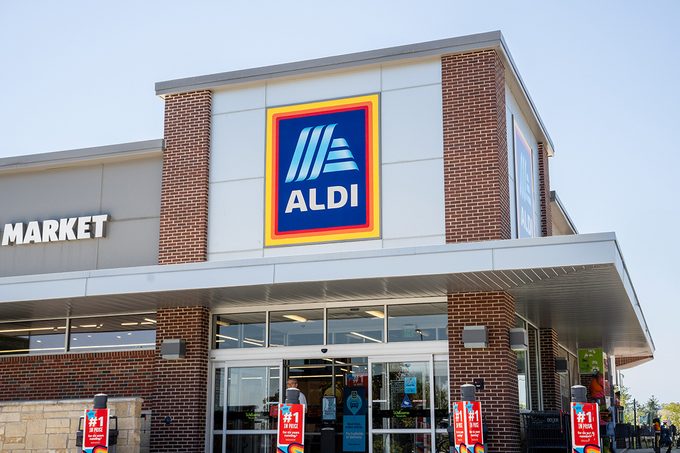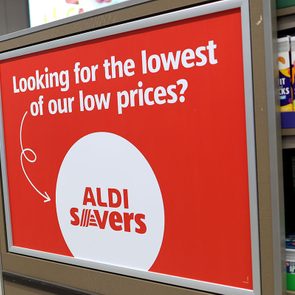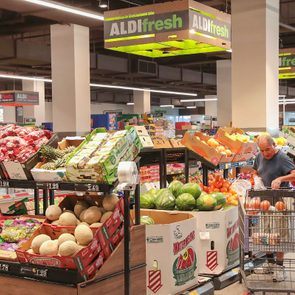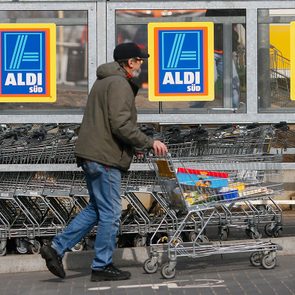No, they aren't part of some anti-sandwich revolution

Here’s Why Aldi Doesn’t Have a Deli Counter

You can find just about anything at Aldi—from bakery muffins to a Pilates reformer (yes, they once sold a limited number of these in Aldi’s Aisle of Shame). But one thing noticeably missing from the store is a deli counter. While you can purchase prepackaged lunch meat for anywhere from $3 to $6, there isn’t a dedicated space where an employee is slicing those items to order.
So, why doesn’t Aldi have a deli counter? Pretty much every quirk the grocer has, down to why their cashiers stay seated at checkout, is all part of an effort to keep their prices low. But the answer here is more nuanced than that. So let’s dig in.
Get Reader’s Digest’s Read Up newsletter for more news, humor, travel, tech, cleaning and fun facts all week long.
Why doesn’t Aldi have a deli counter?

Aldi prices are low, in part, due to its efficiency in moving customers in and out of the store quickly. While a deli counter has its appeal, it can certainly lengthen the amount of time shoppers spend in a location.
“Aldi has likely decided that given its model of low cost, low option, small stores, operating a deli counter is just not worth the overhead and risks,” says Amrita Bhasin, CEO of Sotira, a company in the reverse supply chain space working with food manufacturers and grocery stores on inventory planning. “With a store like Aldi, people can be in and out quickly, and this makes people come purchase more frequently than they would at a bigger grocery or warehouse store like Costco, which is seen as such an ordeal.”
Recalls are also a concern
Bhasin says that recalls are a major concern for grocery stores, and in the hierarchy, one of the categories most often impacted is the deli.
“Temperature control is crucial, and not having adequate reefer temperatures (the refrigerated container or trailer used for transporting/storing temperature-sensitive items), especially during the summer, is a huge obstacle for grocers,” she says. “We are seeing this right now with the example of chocolate; a lot of the stores we work with are scared to make large purchases of chocolate and candy during the summer months for fear of it melting. Deli meat absolutely needs to be kept at adequate temperatures; the consequences can be fatal for customers.”
Why are deli counters expensive to run?
Running a deli counter isn’t as simple as slicing meat and cheese. Staff needs a variety of different trainings apart from learning how to operate the equipment. They need guidance on how to handle knives, wearing gloves, the ins and outs of cross-contamination and knowledge about allergies. On top of that, a deli counter requires compliance documentation and permits.
“Deli counters often can lead to lines, and this can crowd that part of the grocery store,” Bhasin says. “People tend to come in to make deli purchases at certain times of day, and it is hard to run a deli counter only at certain times and match it up with that so there’s sufficient staff.”
Plus, Bhasin points to the cost of ice as well as electricity, which needs to run all the time in order to keep meats and cheeses fresh.
Is it OK to buy deli meat at Aldi?
Yes, it’s fine to buy prepackaged deli meat at Aldi. Naturally, you’ll want to check expiration dates prior to purchasing, but there’s nothing inherently wrong with the lunch meats the grocer sells.
It is worth mentioning that prepackaged deli meat does tend to be more processed than selections sliced to order at a deli counter, according to the Cleveland Clinic. Because of this, they tend to have more preservatives, like nitrates and nitrites.
Instead, look for Aldi prepackaged deli meats that say no nitrites or nitrates (this is typically the case with their organic options). Bonus points if it’s also labeled as low-sodium.
RELATED:
- This Is the Best Time to Go to Aldi for the Steepest Discounts and Biggest Selection
- Here’s Why Aldi’s Barcodes Are So Long
- Here’s How You Can Score a Golden Ticket at Aldi
About the expert
|
Why trust us
At Reader’s Digest, we’re committed to producing high-quality content by writers with expertise and experience in their field in consultation with relevant, qualified experts. We rely on reputable primary sources, including government and professional organizations and academic institutions as well as our writers’ personal experiences where appropriate. We verify all facts and data, back them with credible sourcing and revisit them over time to ensure they remain accurate and up to date. Read more about our team, our contributors and our editorial policies.
Sources:
- Amrita Bhasin, CEO of Sotira, a company that operates in the reverse supply chain space
- Cleveland Clinic: “Is Deli Meat Bad for You? How to Choose a Healthier Lunch Meat”



